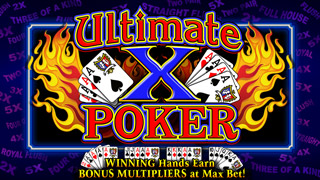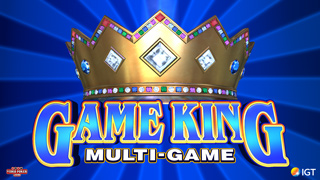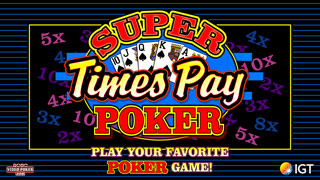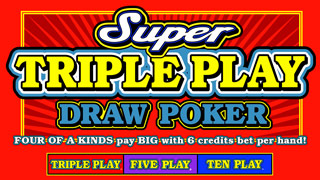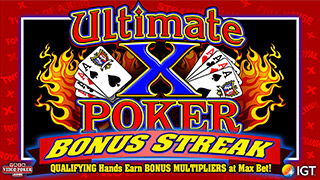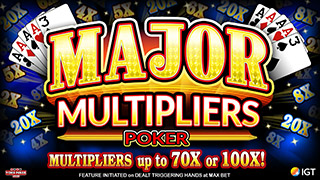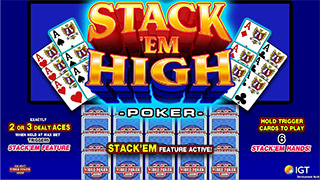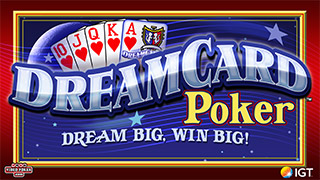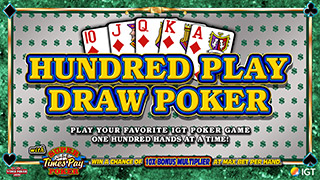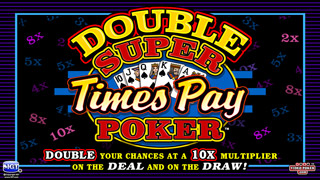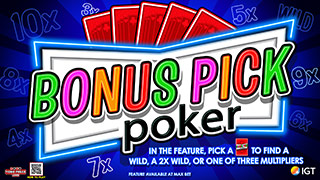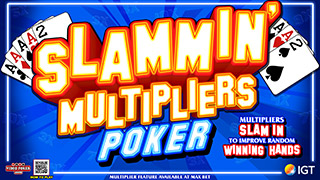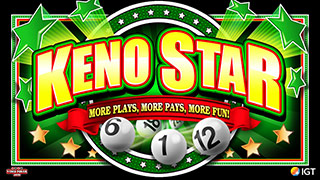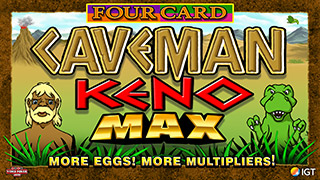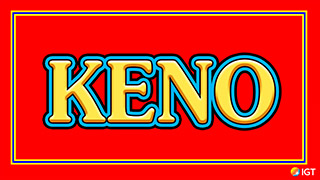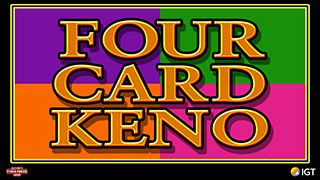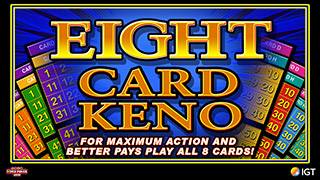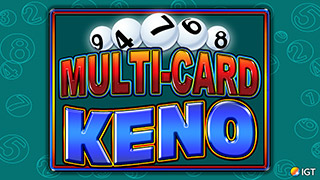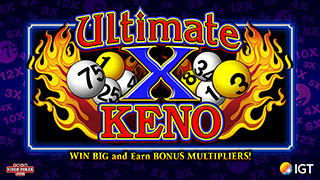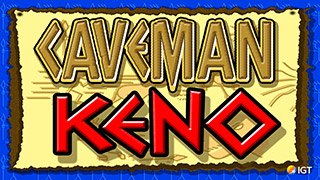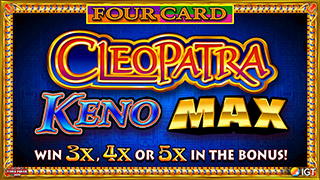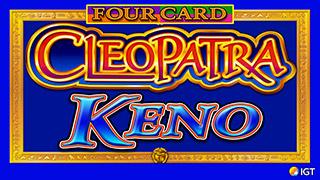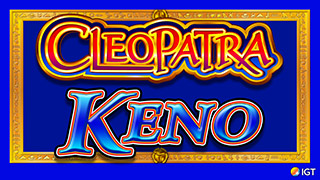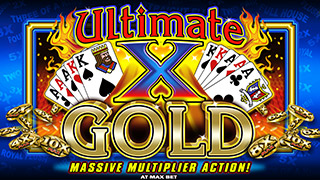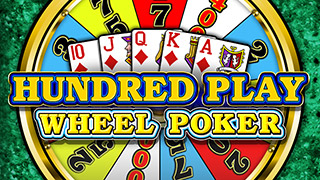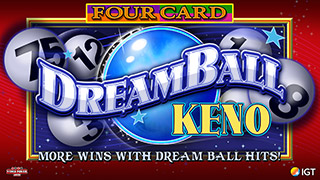Does this math work?
-
shadowman
- Video Poker Master
- Posts: 3587
- Joined: Mon Oct 23, 2006 5:42 pm
Re: Does this math work?
Now, consider what would happen if the quarter game was 9/5 DDB at 97.87%. Since this is quite close to the short pay dollar game at 97.83% the situation looks better.
For every 100 hands of quarter full pay you expect to lose 1.13% of $125 or $1.41.
For every 100 hands of dollar short pay you expect to lose 1.17% of $100 or $1.17.
Clearly, in this case the short pay game is better.
For every 100 hands of quarter full pay you expect to lose 1.13% of $125 or $1.41.
For every 100 hands of dollar short pay you expect to lose 1.17% of $100 or $1.17.
Clearly, in this case the short pay game is better.
-
Frank Kneeland
- VP Veteran
- Posts: 762
- Joined: Wed Feb 02, 2011 6:59 pm
I'm back from my play. I'll start working on replies in order.P.S. Three hours of driving to make this play and some stupid guy that fancies himself a radio show host hit the dam thing in 5 minutes...oh wait that was me.P.P.S. The play also took three days to scout. Three weeks to do the strategy, and this is only the third time I've played it. All three times were large wins, thought the ratio of prep to play is still about 40 to 1. This to me is gambling.If you don't walk into casinos with the intent to play today, good things can still be found.
-
Frank Kneeland
- VP Veteran
- Posts: 762
- Joined: Wed Feb 02, 2011 6:59 pm
I think I understand Phil's point. Since you are LEAST likely to get an RF in any one hand with a 52-card deck versus any other result, not playing for it, and accepting the lower payout for a non-max bet if you happen to hit it, may be a viable approach.
I have actually used that approach in at least one casino with no TDB available, and the DDB pay table being significantly stronger on the $5 single line than the $1 single line with the same game. I chose to not play for $25/hand on max bet versus a $5/hand single coin bet, since I knew I was not going to play a lot of hands in that session. The "possibility" of hitting an RF did not change with each hand played, but the "probability" of hitting one in that session was a function of the number of hands I played in that session (sorry, Frank). I did not hit an RF, but did hit some nice 4 OAKs, and some better paying FHs and Flushes, relative to my bet, along the way. Overall, it was a winning session, due in part to the stronger pay table, and of course, some good luck. Even though I eliminated, somewhat, the RF return opportunity, putting myself in position to benefit from some short-term luck on premium hands provided a better return relative to my bankroll within that session. It is difficult for me to understand exactly what you're trying to say here, but one thing stands out. You keep talking about actual results in a discussion about expectancy and the future. As long as you continue to mix the past, present and future we will never understand each other.
-
Frank Kneeland
- VP Veteran
- Posts: 762
- Joined: Wed Feb 02, 2011 6:59 pm
Frank, please tell me why he is expected to lose if hes only playing infrequently? For the same reason that how many times you intend to flip a coin does not effect how many sides it has.If I offer you a simple coin flip game where in the event that heads comes up I 'll pay you $1 and if tales comes up you will pay me $1.02; you are EXPECTED to lose 1 cent on each play. "Expected to lose" does not mean you "have to lose", or that "you will lose", or that even if you do lose you will lose exactly 1 cent per play.What happens does not, and never can change the expectancy.How much can a portion of a percent make in such a case?A 1% difference would make 1 cent difference to the expectation for every dollar wagered. A nickel a hand on 5-coin $ machines. It adds up faster than you think.I seem to have
my best days and results when I just pop into a casino with some friends
for a quick beer or two and I'm playing wherever machine they roll me
up to, and most times its a piss poor pay-table. The key word in this paragraph was "seem" and since on these days you choose to play these machines, you cannot know how you did on the better machines you choose not to play. This is known as informational bias and selective recruitment.
-
Frank Kneeland
- VP Veteran
- Posts: 762
- Joined: Wed Feb 02, 2011 6:59 pm
Frank is absolutely correct in his assessment of my motive. Although it may be hard for him to understand that people play VP for lots of other reasons than to make money.
I fully realize I am guaranteed to lose money long term playing these games. We could find other money losing diversions like golf, travel, boating, antique cars, whatever; but my wife and I like the casino atmosphere and the excitement of winning once in a while. We could also move to Vegas or fly around the country looking for 100% games (not). For us, Video Poker is strictly entertainment . I suspect the vast majority of recreational VP players in the world are just like us.Our goal is to "play an exciting game as long as possible with the least amount of long term loss and have a chance of walking away with money once in a while". If the pay schedules are the same, do you think playing DDB one coin dollars meets this goal better than playing DDB 5 coin quarters? OK that's about what I thought. And yes it's difficult for me to understand, but not impossible, especially when someone like yourself is so honest about their motives.If you will be just as satisfied hitting 1 coin hands as 5 coin hands then it might well be better for you to play 1 coin. I'll need the exact game and full pay-table and I'll generate a 1 coin strategy for you, and post it with expected hourly loss tables compared to 5 coin action.How's that???
-
onemoretry
- Video Poker Master
- Posts: 3124
- Joined: Tue Mar 03, 2009 8:00 pm
I don't think a $250 Royal is a bad thing, it's all money.
But, in the first post in this thread, you indicated that it took since last summer to "get over" the two short coin royals you had then.
In fact, that is what prompted me to comment in the first place - the notion that getting royals was, somehow, disappointing.
But, in the first post in this thread, you indicated that it took since last summer to "get over" the two short coin royals you had then.
In fact, that is what prompted me to comment in the first place - the notion that getting royals was, somehow, disappointing.
-
FloridaPhil
- Video Poker Master
- Posts: 6229
- Joined: Sat Jul 19, 2008 11:28 am
Great discussion. The most common DDB game in the our area is 8/5. As Dancer says in his book "Would you like to be run over by a truck or a bus!". Anyway, playing this game with 5 coins returns 96.786% vs. playing it with one coin at 95.554%. That's a 1.232% difference. If my math is right, the cost of playing 800 hands an hour at one coin dollars vs. 5 coin quarters in this example is about $10 an hour. On the other hand, because you have less money in play you will be theoretically able to play 20% more hands, which reduces the cost of play between between 4AK pays. Also, (this is the exciting part for me) you can switch to 5 coins when things are crazy and score big. I realize this makes no logical sense, but I've hit some nice $1000+ jackpots this way.
-
shadowman
- Video Poker Master
- Posts: 3587
- Joined: Mon Oct 23, 2006 5:42 pm
Great discussion. The most common DDB game in the our area is 8/5. As Dancer says in his book "Would you like to be run over by a truck or a bus!". Anyway, playing this game with 5 coins returns 96.786% vs. playing it with one coin at 95.554%. That's a 1.232% difference. If my math is right, the cost of playing 800 hands an hour at one coin dollars vs. 5 coin quarters in this example is about $10 an hour. On the other hand, because you have less money in play you will be theoretically able to play 20% more hands, which reduces the cost of play between between 4AK pays. Also, (this is the exciting part for me) you can switch to 5 coins when things are crazy and score big. I realize this makes no logical sense, but I've hit some nice $1000+ jackpots this way.
800 hands * 3.214 * 1.25 = $32.14 / hour
800 hands * 4.446 * 1.00 = $35.56 / hour
Cost difference $3.42 / hour. The amount of money "in play" is already accounted for in the above formula. When you bet 5 coins at the dollar level you increase that cost by a factor of 5.
I'm afraid your justification does not pan out. Obviously, you like to have a chance at playing the higher denomination. You feel that machines get hot and you can take advantage of that situation. Of course, you will never really know unless you track your results. I suspect you are dealing with confirmation bias if one believes RNGs truly are random.
I guess the question from a mathematical point of view is ... are you willing to pay the cost for the added excitement?
800 hands * 3.214 * 1.25 = $32.14 / hour
800 hands * 4.446 * 1.00 = $35.56 / hour
Cost difference $3.42 / hour. The amount of money "in play" is already accounted for in the above formula. When you bet 5 coins at the dollar level you increase that cost by a factor of 5.
I'm afraid your justification does not pan out. Obviously, you like to have a chance at playing the higher denomination. You feel that machines get hot and you can take advantage of that situation. Of course, you will never really know unless you track your results. I suspect you are dealing with confirmation bias if one believes RNGs truly are random.
I guess the question from a mathematical point of view is ... are you willing to pay the cost for the added excitement?
-
shadowman
- Video Poker Master
- Posts: 3587
- Joined: Mon Oct 23, 2006 5:42 pm
What is a "hot streak"? I think that gets to the basic problem here. Let's define a "hot streak" as a period of time when the credits of a machine go upward.
We have all experienced "hot streaks" of various durations. Clearly, hitting any hand that returns more than the bet will increase the number of credits. But, most of us don't consider it to be a hot streak until we've hit multiple good hands. So, I think we can safely state that a "hot streak" takes multiple hands.
But, how long does any "hot streak" last? I suspect most of us have experienced days where it seems we could do no wrong. In addition, we've all experienced much shorter duration "hot streaks" from a few hands to a few hours. This is the key.
How does a person know the "hot streak" they detect will last into the future? The mathematical answer is ... they can't. The duration of any "hot streak" is itself random and there's no way to know whether it will continue. And, in fact, the worse the return of a game the shorter the length of the average "hot streak". There will also be far more short "hot streaks" then long ones.
The net of all this ... you can't predict the future of a random set of events.
We have all experienced "hot streaks" of various durations. Clearly, hitting any hand that returns more than the bet will increase the number of credits. But, most of us don't consider it to be a hot streak until we've hit multiple good hands. So, I think we can safely state that a "hot streak" takes multiple hands.
But, how long does any "hot streak" last? I suspect most of us have experienced days where it seems we could do no wrong. In addition, we've all experienced much shorter duration "hot streaks" from a few hands to a few hours. This is the key.
How does a person know the "hot streak" they detect will last into the future? The mathematical answer is ... they can't. The duration of any "hot streak" is itself random and there's no way to know whether it will continue. And, in fact, the worse the return of a game the shorter the length of the average "hot streak". There will also be far more short "hot streaks" then long ones.
The net of all this ... you can't predict the future of a random set of events.
-
BillyJoe
- Video Poker Master
- Posts: 3198
- Joined: Sat Aug 23, 2008 2:00 pm
[QUOTE=FloridaPhil]Great discussion. The most common DDB game in the our area is 8/5. As Dancer says in his book "Would you like to be run over by a truck or a bus!". Anyway, playing this game with 5 coins returns 96.786% vs. playing it with one coin at 95.554%. That's a 1.232% difference. If my math is right, the cost of playing 800 hands an hour at one coin dollars vs. 5 coin quarters in this example is about $10 an hour. On the other hand, because you have less money in play you will be theoretically able to play 20% more hands, which reduces the cost of play between between 4AK pays. Also, (this is the exciting part for me) you can switch to 5 coins when things are crazy and score big. I realize this makes no logical sense, but I've hit some nice $1000+ jackpots this way.
800 hands * 3.214 * 1.25 = $32.14 / hour
800 hands * 4.446 * 1.00 = $35.56 / hour
Cost difference $3.42 / hour. The amount of money "in play" is already accounted for in the above formula. When you bet 5 coins at the dollar level you increase that cost by a factor of 5.
I guess the question from a mathematical point of view is ... are you willing to pay the cost for the added excitement?[/QUOTE]
See, this is exactly where I have the "math" problem. You are talking about a "Cost difference $3.42 / hour". But that difference is based on the millions of hours of play used to set that Expected Return in that pay table, not just the one hour. What happens in any one particular hour using this approach is more luck than math. Sorry, I do not have a radio show, or the opportunity to jump in to a progressive jackpot game whenever the time is right. Congrats to Frank,by the way, on hitting , though I am not sure why it took three weeks of startegy planning. Show up, hit max bet, win, collect hand pay would have been my strategy .
800 hands * 3.214 * 1.25 = $32.14 / hour
800 hands * 4.446 * 1.00 = $35.56 / hour
Cost difference $3.42 / hour. The amount of money "in play" is already accounted for in the above formula. When you bet 5 coins at the dollar level you increase that cost by a factor of 5.
I guess the question from a mathematical point of view is ... are you willing to pay the cost for the added excitement?[/QUOTE]
See, this is exactly where I have the "math" problem. You are talking about a "Cost difference $3.42 / hour". But that difference is based on the millions of hours of play used to set that Expected Return in that pay table, not just the one hour. What happens in any one particular hour using this approach is more luck than math. Sorry, I do not have a radio show, or the opportunity to jump in to a progressive jackpot game whenever the time is right. Congrats to Frank,by the way, on hitting , though I am not sure why it took three weeks of startegy planning. Show up, hit max bet, win, collect hand pay would have been my strategy .



